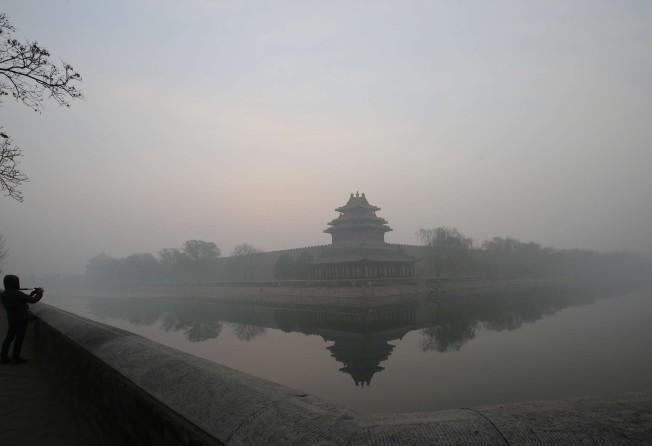China’s capital on high alert for smog again
Beijing and parts of northern China endure air pollution and fog amid rise in temperatures, with flights grounded and outdoor activities cut back

The mainland issued an orange alert for air pollution on Sunday morning as a new round of heavy smog descended on Beijing and parts of northern China over the weekend, leading to restrictions on activities and vehicles.
The smog was expected to persist in southern Beijing, Tianjin, Hebei, Shandong, Henan and Shanxi until Monday, according to the National Meteorological Centre (NMC).
A rise in temperature and humidity as well as a lack of wind in northern China caused the air pollution, according to the Beijing Municipal Environmental Protection Bureau.
Watch: Various parts of China are enveloped in thick, white fog
A cold front moving down from the north should help disperse the smog.
Beijing and nearby Hebei province experienced the worst air pollution, with central and southern Hebei seeing a PM2.5 density of more than 500 micrograms per cubic metre of air, and with visibility reduced to less than 200 metres, the NMC said.
PM2.5 and PM10 refer to hazardous particulate matter in the air.
The mainland has a four-tier colour-coded system for alerts on air pollution, with red being the most serious followed by orange, yellow and blue.
An orange alert means heavy pollution, with a PM2.5 density of more than 150 micrograms per cubic metre of air for three consecutive days.
When the alert is in force, outdoor activities at some schools are cancelled and construction projects are suspended.
In Beijing, kindergartens, primary and middle schools had been advised to reduce outdoor activities. Large vehicles such as garbage trucks had been banned from the roads of Beijing since Friday, Xinhua reported.
Hebei also closed several highway sections to reduce traffic.
Also on Sunday morning, heavy fog in Chengdu, Sichuan province, caused the delay of more than 100 flights.
Nearly 10,000 passengers saw their travel plans delayed.
Some 20 flights flying to and from Tianjin were also delayed, with four of them cancelled due to the fog.
Flights in the two cities gradually resumed after the fog began to disperse around noon.
The NMC also issued an alert for heavy fog in parts of Beijing, Tianjin, Hebei, Sichuan, Chongqing and Guizhou, with visibility possibly reaching less than 200 metres.
Premier Li Keqiang pledged in March in his address to the National People’s Congress to take measures to tackle urban smog, aiming for a target of having “good air quality” for 80 per cent of the year.
But mid-term evaluations conducted by the Chinese Academy of Engineering in July showed that at least seven provinces, including Liaoning and Jilin, not only failed to reduce PM10 concentrations but saw increases.
The capital has set a target of reducing PM2.5 to an average of 60 micrograms per cubic metre of air. However, Beijing’s concentration last year averaged 80.6.
The city has plans to reduce coal consumption for winter heating, replacing it with less-polluting electricity.